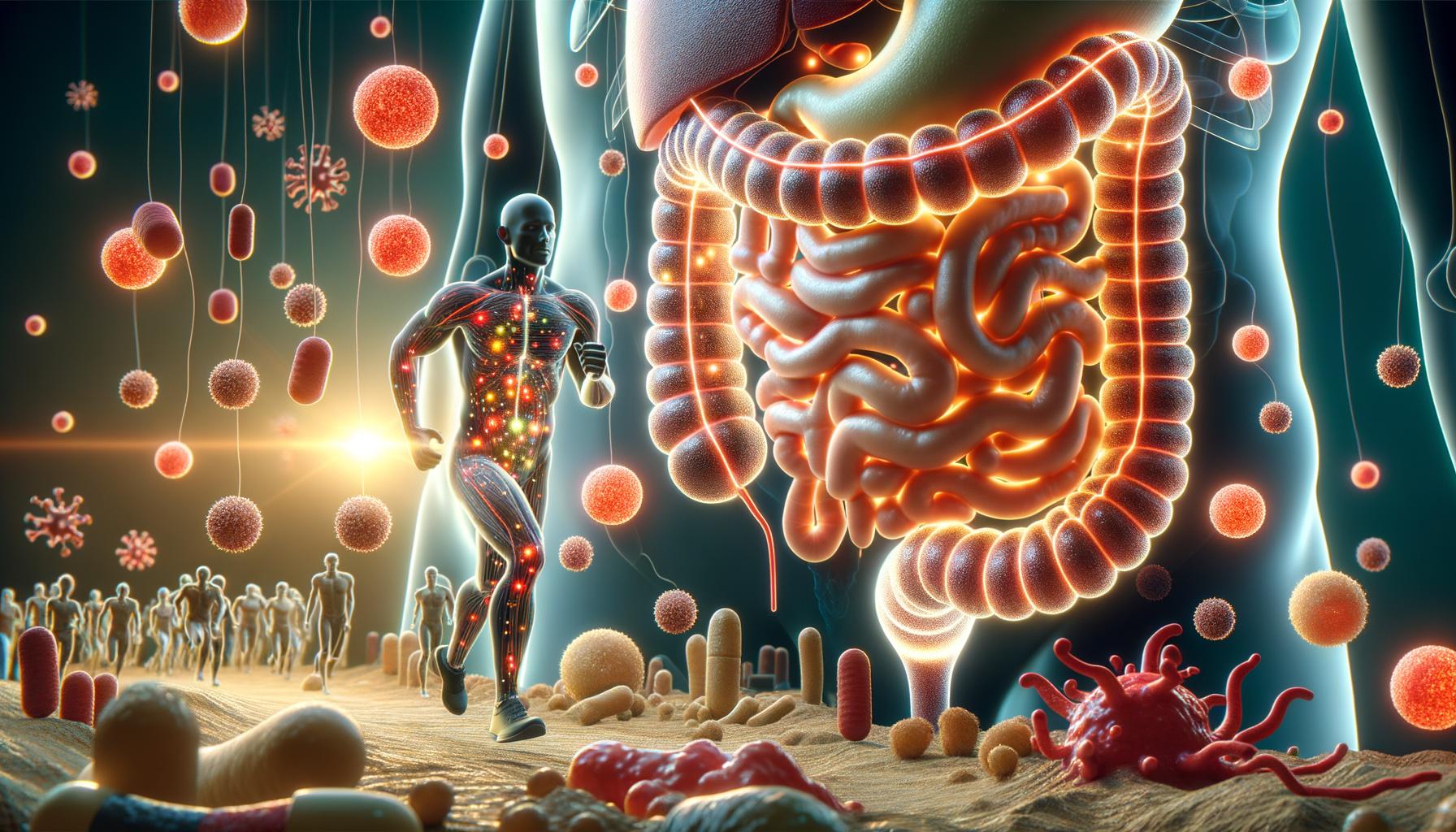· nutrition · 14 min read
Optimizing Exercise with Gut Microbiome Insights
Explore how insights into the gut microbiome can significantly enhance athletic performance and recovery, revealing the symbiotic relationship between gut health and physical fitness.

In This Post
The Fact Why Should I Care How To Put In Action Start Tomorrow Guide How does it effect my ability to focus How does it impact my daily life How does it help me make friends How does it help me manage stress How does it effect my mood Summary: Remember Refresher Checklist The Full Research Article CitationsPrint Out The Tomorrow Checklist!
Sign up for our newsletter and receive a copy today, so that, you can start tomorrow! Or the next day, or the day after that. I forget everything and starting things is hard at least for me so these checklists are godsend.
Print Out The Remember Refresher Checklist!
Sign up for our newsletter and download your own copy of the Remember Refresher Checklist, so that, you can easily put it on your fridge and help you stay on target towards your WHY. Every little bit helps.
Introduction
Understanding the Gut Microbiome
The gut microbiome, an intricate ecosystem residing in our gastrointestinal tract, consists of trillions of bacteria playing a pivotal role in our overall health, including digestion, immune function, and even our mental well-being. This complex community of microorganisms breaks down food components that our own bodies can’t, such as certain types of fiber, turning these into nutrients we can absorb and utilize.
- The role of the gut microbiome in our health
- The conversion of fiber into vital nutrients
- The impact of diet on microbial composition
This symbiotic relationship underpins the importance of maintaining a balanced and diverse gut microbiome for optimal health. In recent years, research has begun to unveil the specific ways in which the microbiome not only influences general well-being but also plays a crucial role in athletic performance and recovery.
The Link Between Gut Health and Athletic Performance
The intersection of gut health and athletic performance is an emerging field of interest. Athletes are constantly seeking ways to enhance performance and speed up recovery times, and gut health appears to be a significant piece of the puzzle. The gut microbiota can influence energy metabolism, inflammation levels, and even pain perception, all of which are critical factors in exercise performance and recovery.
- The gut microbiome’s impact on metabolism and energy levels
- Its role in regulating inflammation and immune function
- The potential for improving endurance and reducing recovery times
Building on this, athletes and those leading active lifestyles are increasingly looking towards improving gut health as a means to gain an edge in their performance and recovery processes. This has led to a surge in interest around dietary and lifestyle interventions aimed at optimizing the gut microbiome for athletic excellence.
The Role of the Gut Microbiome in Exercise Performance
The relationship between our gut microbiome and exercise performance is a fascinating, emerging field of study within sports nutrition and athletic training. This intricate connection offers insights into how athletes can optimize energy levels, endurance, and recovery through gut health.
How the Gut Microbiome Influences Energy Levels
The digestive process orchestrated by our gut microbiome plays a critical role in how we harness energy from our diet. This energy is vital for sustaining prolonged physical activity. The microbiome aids in breaking down food that our body might otherwise struggle to process, converting these nutrients into readily usable energy forms. This capability signifies the importance of a diverse, well-balanced gut microbiota for athletes who require consistent, efficient energy production.
Conversion of Fiber to Short-chain Fatty Acids (SCFAs)
A key function of the gut microbiome in the context of exercise concerns the fermentation of dietary fiber into short-chain fatty acids (SCFAs). These compounds are essential for health, imparting numerous benefits including serving as an energy source for muscle cells and regulating metabolism. The types of fiber that most effectively feed the gut microbiome and result in SCFA production include:
- Inulin
- Fructooligosaccharides (FOS)
- Resistant starch
- Beta-glucans
- Pectin
Incorporating a variety of these fibers into one’s diet can promote SCFA production and, in turn, enhance athletic performance.
The Impact of SCFAs on Endurance and Recovery
Short-chain fatty acids are not just beneficial for immediate energy provision; they also play a role in improving endurance and aiding recovery post-exercise. SCFAs help to:
- Increase energy extraction from the diet, making energy reserves last longer during endurance sports.
- Reduce inflammation, aiding in quicker recovery times and less muscle soreness.
- Support the health of intestinal cells, maintaining gut barrier integrity which is crucial for preventing chronic inflammation and promoting overall health.
To fully leverage the benefits of SCFAs for exercise performance and recovery, athletes should ensure their diet is rich in diverse, fermentable fibers. This can be achieved by including a variety of fruits, vegetables, whole grains, and legumes in their daily nutrition plan.
---checklist---
- Include a variety of fiber-rich foods in your diet to promote SCFA production.
- Focus on fermentable fibers such as inulin, FOS, resistant starch, beta-glucans, and pectin.
- Consider incorporating probiotic and prebiotic supplements to support a healthy gut microbiome diversity.
- Monitor gut health periodically to assess the need for dietary adjustments. ---checklist---
By nurturing a healthy gut microbiome, athletes can optimize their energy levels, enhance their athletic endurance, and improve recovery times, thereby gaining a competitive edge in their sports performance.
Enhancing Athletic Recovery through Gut Health
Reducing Inflammation for Quicker Recovery
Inflammation is a double-edged sword in the realm of athletic performance. While it’s a natural and necessary response to exercise, aiding in muscle repair and growth, excessive inflammation can lead to prolonged recovery times and decreased performance. This is where the gut microbiome comes into play. A balanced gut microbiome can help modulate the body’s inflammatory response. Certain strains of bacteria within the microbiome are known to produce substances that can reduce inflammation. For example, some species of Bifidobacteria and Lactobacillus can produce anti-inflammatory compounds that help soothe the gut lining and, by extension, influence systemic inflammation levels.
Athletes can take practical steps to reduce inflammation through gut health strategies. Ensuring a diverse intake of prebiotics through a varied diet supports the growth of beneficial bacteria. Fermented foods and probiotic supplements can also introduce beneficial bacteria directly into the gut. By fostering a healthy gut microbiome, athletes can better manage inflammation, aiding in quicker recovery times after intense physical activity.
Maintaining Gut Barrier Integrity
The integrity of the gut barrier is vital for overall health and athletic performance. A compromised gut barrier can lead to increased permeability, often referred to as “leaky gut,” which may allow harmful substances to enter the bloodstream, leading to inflammation and other health issues that can hamper recovery and performance.
Maintaining gut barrier integrity involves supporting the cells that line the gut and ensuring they have the nutrients needed to form tight junctions. Nutrients like glutamine, found in bone broth and supplemental forms, have been shown to support gut lining health. Omega-3 fatty acids, zinc, and antioxidants can also play a role in maintaining a healthy gut barrier.
Dietary Strategies to Boost Gut Health and Performance
To harness the power of the gut microbiome in enhancing athletic recovery and performance, incorporating specific dietary strategies can be greatly beneficial. Here’s a checklist to help athletes optimize their gut health:
Prebiotics: Include a variety of fiber-rich foods in your diet, such as fruits, vegetables, whole grains, and legumes, to feed the beneficial bacteria in your gut.
Probiotics: Consume fermented foods like yogurt, kefir, sauerkraut, and kimchi, which contain live beneficial bacteria. Probiotic supplements can also be considered, especially those with strains backed by research for athletic populations.
Polyphenols: Focus on foods rich in polyphenols, such as berries, nuts, seeds, olive oil, and green tea. Polyphenols can promote the growth of beneficial bacteria and inhibit harmful bacteria.
Hydration: Maintain adequate hydration, as water is essential for the proper functioning of the gut and for facilitating the transport of nutrients and removal of waste.
Mindful Eating: Avoid excessive intake of processed foods, artificial sweeteners, and alcohol, which can negatively impact gut health. Stress management and adequate sleep are also key components of a holistic approach to gut health.
By pursuing a comprehensive approach to gut health that encompasses reducing inflammation, maintaining gut barrier function, and strategic dietary choices, athletes can optimize their recovery process and performance. Ultimately, recognizing the gut as a central player in the athletic performance and recovery equation opens new avenues for nutrition strategies that support long-term health and athletic endeavors.
Scientific Evidence and Case Studies
Research Findings on Gut Microbiome and Athletic Performance
In recent years, the exploration into how the gut microbiome affects physical fitness and athletic performance has burgeoned, revealing fascinating insights. A landmark study in the domain found that endurance athletes had a significantly diverse gut microbiota composition compared to non-athletes. This diversity included a higher prevalence of bacteria capable of producing short-chain fatty acids (SCFAs), highlighting the potential metabolic benefits of a healthy gut for athletes. Moreover, SCFAs have been pinpointed as a critical energy source during prolonged exercise, underscoring the integral role of gut health in sustaining energy levels and performance.
Further investigation into the role of bacteria in muscle recovery has unveiled that certain probiotic strains can expedite recovery by reducing inflammation and oxidative stress post-exercise. The symbiotic relationship between dietary intake, specifically fermentable fibers, and SCFA production further emphasizes the importance of nutritional strategies for gut microbiome optimization.
Athletes’ Success Stories: Gut Health Interventions
The theoretical findings in scientific research have been bolstered by tangible success stories from the athletic world. Numerous athletes have reported remarkable improvements in recovery times, energy availability, and overall performance after integrating gut health interventions into their routines. These interventions often include:
- A high fiber diet, rich in variety to promote microbiota diversity
- Regular intake of probiotics and prebiotics to support beneficial bacterial growth
- Strategies to maintain gut barrier integrity, such as reducing stress and optimizing sleep
These anecdotal evidences serve as powerful testimonials to the practical benefits of prioritizing gut health in the quest for athletic excellence.
Limitations and Areas for Further Research
While the burgeoning field of gut microbiome research has unveiled promising correlations between gut health and athletic performance, it remains in its infancy. A few notable limitations include:
- A lack of longitudinal studies to establish causality rather than mere association
- The need for personalized gut health interventions, considering the unique microbiota composition of individuals
- The exploration of gut dysbiosis and its potential reverse effects on performance and recovery
Further Research Checklist
- Longitudinal studies on the direct impact of gut microbiota on athletic performance
- Personalized nutrition and probiotic interventions based on individual microbiome profiles
- Examination of the negative impacts of gut dysbiosis on physical fitness and recovery mechanisms
As the scientific community continues to unravel the complexities of the gut microbiome and its impact on physical fitness, the future holds the promise of more targeted and effective strategies to optimize athletic performance through gut health interventions.
FAQs (Based on “People Also Ask” Section from Google)
How do SCFAs affect exercise recovery?
Short-chain fatty acids (SCFAs) produced in the gut through the fermentation of fiber play a significant role in exercise recovery. They serve as a primary energy source for colon cells, helping to maintain gut health, but their benefits extend to muscle recovery and inflammation reduction. SCFAs, especially butyrate, possess anti-inflammatory properties that can alleviate the systemic inflammation often induced by intense, prolonged exercise. This reduction in inflammation can lead to quicker recovery times, allowing athletes to return to training with reduced risk of injury or overtraining.
Can improving gut health enhance athletic performance?
Absolutely. The gut microbiome impacts an athlete’s health and performance in numerous ways. A healthy gut contributes to:
- More efficient nutrient absorption, ensuring that the body receives the vitamins and minerals necessary for energy production, muscle contraction, and overall health.
- Reduced inflammation, which can improve recovery times and decrease the risk of chronic injuries.
- Enhanced immune function, keeping athletes healthy and training consistently.
In short, by maintaining a balanced gut microbiome, athletes can ensure their body is more adept at energy production, nutrient absorption, and staying healthy, all of which are fundamental for optimal performance.
What foods promote a healthy gut microbiome for athletes?
Athletes looking to support their gut microbiome should focus on incorporating a variety of nutrient-dense, whole foods that promote the growth of beneficial bacteria. Here’s a checklist of food types that are particularly beneficial for gut health:
[] Fiber-rich foods: Such as whole grains, fruits, and vegetables, which provide the raw materials for SCFA production.
[] Fermented foods: Yogurt, kimchi, sauerkraut, and kefir contain live probiotics that can enhance the diversity and health of gut microbiota.
[] Prebiotic foods: Items like garlic, onions, bananas, and chicory root fuel the beneficial bacteria already present in the gut.
[] Polyphenol-rich foods: Dark chocolate, green tea, and berries contain compounds that beneficial bacteria thrive on, potentially leading to increased diversity.
[] Lean proteins: Support overall gut health and recovery, especially important for athletes engaging in regular, intense exercise sessions.
Ensuring a diet rich in these food types can not only foster a healthier gut microbiome but consequently enhance athletic performance and recovery by optimizing the metabolic and immune functions that are critical for athletes.
Conclusion
Throughout this in-depth exploration, we’ve uncovered the profound impact that the gut microbiome holds over athletic performance and recovery. By delving into how short-chain fatty acids (SCFAs) derived from fermentation of dietary fibers influence energy metabolism, endurance, and inflammation control, we’ve highlighted the intrinsic link between gut health and physical fitness. The emerging scientific evidence underscored, along with anecdotal success stories from athletes, cements the value of nurturing our gut microbiomes for achieving peak physical condition.
Summary of Key Points
- The gut microbiome plays a crucial role in modulating energy levels, recovery rates, and overall athletic performance through the production of SCFAs.
- Nutritional strategies focusing on the intake of fiber-rich diets, prebiotics, and probiotics can significantly enhance gut health, thereby supporting athletic endeavors.
- Reduction of inflammation and maintenance of the gut barrier function are vital for accelerated recovery and sustained performance.
- Continuing research and personal trial-and-error with dietary adjustments offer pathways for athletes and coaches to harness the benefits of a healthy gut microbiome.
Future Implications for Athletes and Coaches
As we look forward to the evolution of sports science and nutrition, the significance of the gut microbiome will undoubtedly grow. Athletes and coaches armed with this knowledge have a powerful tool at their disposal for optimizing training, enhancing recovery, and pushing the boundaries of athletic performance. To leverage these insights effectively, consider implementing the following checklist into your routine:
- Incorporate a wide variety of fiber-rich foods to promote SCFA production and diversity in gut microbiota.
- Regularly consume probiotics and prebiotics to support microbiome balance and gut barrier integrity.
- Monitor and adjust dietary strategies based on personal responses to optimize gut health and physical performance.
- Stay informed on the latest research regarding the gut microbiome’s impact on athletics to refine nutritional and training protocols.
- Consult with sports nutrition professionals to tailor gut health strategies that align with individual needs and goals.
The journey towards optimizing exercise and athletic achievement through gut microbiome insights is just beginning. By embracing the interplay between diet, gut health, and physical fitness, athletes can unlock unparalleled performance levels. Looking ahead, the collaborative efforts between researchers, nutritionists, and the athletic community promise to unveil even deeper understandings and more potent strategies for exploiting this fascinating relationship.
Relevant External Links
As we wrap up our exploration into optimizing exercise with insights from the gut microbiome, it’s crucial to have access to reliable sources for further reading and research. The intersection of gut health and athletic performance is a rapidly growing area of study that promises greater insights and potential interventions for athletes and those interested in physical fitness.
Here are three external links that offer valuable information and perspectives on this topic:
Professional Nutrition Guidelines
For those seeking authoritative advice on nutrition for athletes, including how diet can affect the gut microbiome, visit the International Society of Sports Nutrition. This site is a treasure trove of research-based guidelines and recommendations for sports nutrition. Whether you’re a professional athlete, a coach, or someone interested in enhancing performance through diet, this resource provides in-depth information to guide your nutritional strategies.Research on Gut Microbiome
The National Institutes of Health - Gut Microbiome page is an excellent source for the latest research and findings on the gut microbiome. It covers a wide range of topics from the basics of microbiome science to the latest research findings on how the gut impacts overall health, including physical performance and recovery. This resource is invaluable for those interested in the science behind gut health and its implications for athletes.Digestive Health for Runners
For a more focused exploration of how gut health affects runners specifically, Athlete’s Gut: The Inside Science of Digestion is a must-read. This resource breaks down the complexities of digestion, nutrient absorption, and how to manage common digestive issues among runners. It’s a great read for endurance athletes looking to optimize their performance and comfort during training and competitions.
Further Reading Checklist
- Consult the International Society of Sports Nutrition for comprehensive nutritional guidelines tailored to athletes.
- Visit the National Institutes of Health website for the latest research findings on the gut microbiome and its impact on health and athletics.
- Explore Athlete’s Gut: The Inside Science of Digestion for insights into managing digestive health specifically for runners and endurance athletes.
Each of these resources serves as a stepping stone for athletes, coaches, and fitness enthusiasts to delve deeper into the fascinating intersection of gut health and physical performance. By staying informed through reputable sources, you can make empowered decisions that enhance your training, performance, and overall well-being.
- gut-health-and-physical-fitness
- short-chain-fatty-acids-scfas
- athletic-performance-and-gut-microbiota
- fiber-rich-diets-and-scfa-production
- inflammation-reduction-for-athletes
- gut-barrier-function-and-endurance-sports
- nutritional-strategies-for-gut-microbiome
- probiotics-and-athletic-recovery
- exercise-physiology-and-microbiome-research
- prebiotics-probiotics-and-athletic-performance
- gut-dysbiosis-and-physical-performance
- fermentable-fibers-and-scfas
- microbiota-diversity-for-improved-endurance
- metabolic-benefits-of-a-healthy-gut-for-athletes
- role-of-bacteria-in-muscle-recovery





